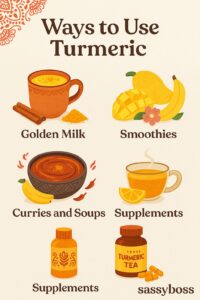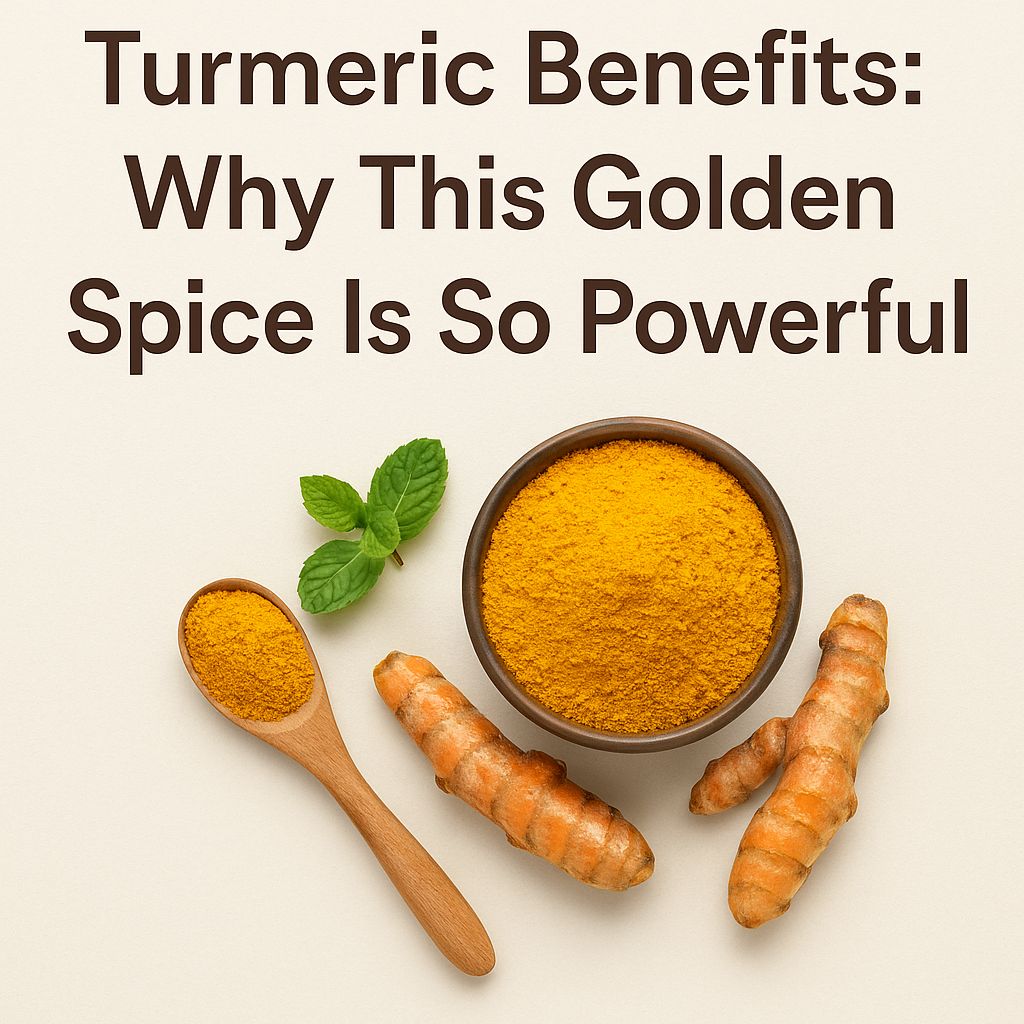Turmeric Benefits: Why This Golden Spice Is So Powerful
The bright golden spice that you keep hidden in your kitchen cupboard, turmeric, is much more than simply a pretty component. Turmeric, whose scientific name is Curcuma longa, has been revered for ages in India and other parts of Asia as one of the most powerful natural remedies. The majority of its health advantages that have been scientifically verified are due to curcumin, its main component.
This article will examine the many advantages of turmeric, explain why it is regarded as a superfood in both conventional and alternative medicine, and even provide easy ways to incorporate it into your daily routine.
A Brief History of Turmeric
Prior to talking about its advantages, it’s important to recognize turmeric’s historical significance. Turmeric has been used for more than 4,000 years in Chinese and Ayurvedic medicine to treat a wide range of illnesses, including joint pain, skin disorders, digestive problems, and respiratory disorders. In addition to being a common cooking item, it plays a significant role in religious rites and cosmetic treatments in India.
What ancient civilizations previously knew—that turmeric is genuinely amazing—is only now being recognized by modern science.
The Power Behind Turmeric: Curcumin
The main active component of turmeric, curcumin, is responsible for the majority of its potent health benefits. Curcumin is a potent antioxidant and a naturally occurring anti-inflammatory substance. However, curcumin is difficult to get into the bloodstream and only makes up 2–8% of the weight of turmeric.
It is frequently advised to take turmeric with black pepper, which includes pipeline, a natural compound that increases absorption of curcumin by up to 2000%.
Top Health Benefits of Turmeric
1. Potent Anti-Inflammatory Properties
Numerous serious illnesses, such as cancer, Alzheimer’s, heart disease, and other degenerative diseases, are thought to be influenced by chronic inflammation. Turmeric is a natural anti-inflammatory because curcumin can help block chemicals involved in inflammation.
Long-term inflammation can become a silent killer, yet short-term inflammation is essential for battling infections. An all-natural, safer substitute for prescription anti-inflammatory drugs that don’t have unpleasant side effects is turmeric.
2. Powerful Antioxidant Effects
One of the processes underlying aging and numerous illnesses is oxidative damage. Antioxidants counteract free radicals, which are unstable chemicals that can harm cells. Curcumin is a strong antioxidant that can increase the activity of the body’s own antioxidant enzymes in addition to blocking free radicals.
Because of its dual benefits, turmeric is incredibly powerful at reducing oxidative stress and shielding your body from long-term health problems.
3. Boosts Brain Function and Lowers Risk of Brain Diseases

One kind of growth hormone that works in your brain is called brain-derived neurotrophic factor (BDNF), and curcumin raises its levels. A number of prevalent brain conditions, such as Alzheimer’s disease and depression, have been connected to BDNF deficiency.
Turmeric may help prevent or even correct a number of brain disorders and age-related declines in brain function by raising BDNF levels. According to some research, it may even increase intelligence and memory!
4. Supports Heart Health
Globally, heart disease continues to be the leading cause of death. The endothelium, the lining of your blood vessels, can operate better when you take turmeric. One of the main causes of heart disease is endothelial dysfunction, which is the incapacity of your endothelium to control blood pressure, blood coagulation, and other processes.
Turmeric’s antioxidant and anti-inflammatory qualities also help lower the risk of heart disease.
5. May Help Prevent (and Treat) Cancer
According to a number of studies, curcumin may have molecular effects on the initiation, progression, and spread of cancer. It may lessen angiogenesis—the development of new blood arteries in tumors—avoid metastasis, or the spread of cancer, and aid in the death of diseased cells.
Turmeric has a lot of promise as a supplemental medicine for cancer treatment, especially for digestive system tumors like colorectal cancer, but more research is required.
6. Fights Depression

Curcumin has demonstrated potential in the treatment of depression. Curcumin was found to be just as successful in reducing depressive symptoms in a controlled experiment as Prozac. Curcumin is thought to increase dopamine and serotonin, the “happy” neurotransmitters in the brain.
Turmeric is a promising natural supplement for mental health because of its capacity to raise BDNF levels, which promotes general emotional well-being.
7. Improves Skin Health
Turmeric’s anti-inflammatory, antibacterial, and antioxidant qualities make it useful for a number of skin disorders, including psoriasis, eczema, and acne. Turmeric is increasingly a common ingredient in skincare products to combat dullness, enhance skin tone, and lessen inflammation.
You may promote radiant, healthy skin by using turmeric masks, taking supplements, or just including it in your diet.
How to Add Turmeric to Your Diet

Incorporating turmeric into your daily life is easier than you might think:
• Golden Milk: Mix turmeric with warm milk (or plant-based milk), a pinch of black pepper, and honey for a comforting and healing drink.
• Smoothies: Add a teaspoon of turmeric to your morning smoothie for a golden boost.
• Curries and Soups: Turmeric is a classic addition to curries, stews, and soups.
• Turmeric Tea: Boil water with turmeric and ginger, strain, and sip!
• Supplements: Curcumin supplements are widely available. Look for ones that include black pepper extract (piperine) for better absorption.
Tip: As your body adjusts, gradually increase the dosage from ½ to 1 teaspoon daily.
Possible Side Effects and Precautions
Although most people can safely use turmeric, prolonged usage or large dosages may result in gastrointestinal problems like nausea, lightheadedness, or diarrhea. Before using turmeric supplements, patients with gallbladder disease, pregnant women, and those taking blood thinners should speak with their doctor.
As with anything, moderation is key. When in doubt, talk to your doctor.
Final Thoughts
Turmeric is a genuine gift from nature, and it adds spice to your food. This ancient golden spice is a great addition to any wellness regimen because of its many health advantages, which include lowering inflammation, improving brain function, and even combating depression.
One of the simplest and most natural ways to promote a happier, healthier you may be to incorporate turmeric into your everyday routine.
